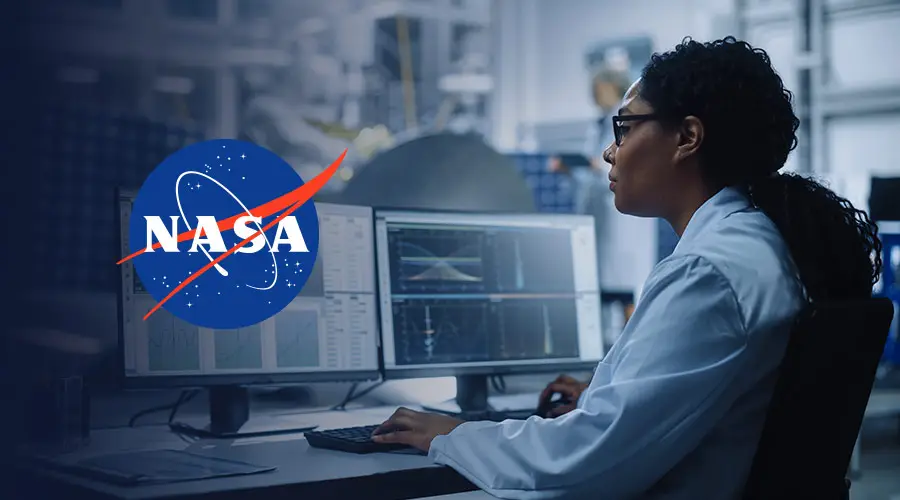In 1958, the U.S. government established the National Aeronautics and Space Administration (NASA) to advance human achievements in science, aeronautics, technology and spaceflight. Scientists, mathematicians and engineers have since helped put people on the moon and rovers on Mars and have taken high-definition photos of every planet in our solar system.
As NASA continues to push boundaries, the agency has also focused on supporting education and careers in science and engineering among communities that have historically lacked access to such opportunities. In 2021, the Biden-Harris Administration issued a series of executive orders that sponsored the establishment of NASA’s Minority University Research and Education Project (MUREP).
Ahead, we discuss how MUREP has created pathways to careers with NASA for people of color. We also reveal the eight Historically Black Colleges and Universities (HBCUs) that received awards from NASA’s Data Science Equity, Access and Priority (DEAP) opportunity and other educational pathways for students interested in STEM from communities that often lack access and educational opportunities.
NASA’s MUREP
NASA’s MUREP was established as a pathway for STEM talent from HBCUs and other Minority Serving Institutions (MSIs). This also included a commitment from the universities to invest in research initiatives. MUREP is the liaison between NASA and these universities and is charged with establishing policies for their work together.
HBCUs Chosen to Receive DEAP Funding
In 2023, NASA selected eight HBCUs to receive funding through its MUREP Data Science Equity, Access and Priority (DEAP) opportunity. The universities received a total of $11.7 million and were given three years to develop research partnerships geared toward advancing innovation in data science-related fields. These partnerships will assist NASA with crucial research initiatives that require data science knowledge.
“We’re pleased to make progress through awards like this to intentionally build the STEM pipeline of the future, especially in communities of color,” said NASA Deputy Administrator Pam Melroy. “It’s fitting…that we make this tangible step to build on the talent pool at HBCUs in our ongoing work to bring to the table all the talents and perspectives we’ll need to send humans to the Moon, Mars and beyond and do amazing science throughout the solar system.”
The eight HBCUs chosen for this program are:
- Bethune-Cookman University: This HBCU is developing a project to measure global sea levels using an array of satellites and machine learning techniques to process the data.
- Fayetteville State University: This institution is collaborating with NASA’s Jet Propulsion Laboratory using data science to expand upon current scientific research.
- Florida A&M University: This HBCU is developing a project to study salt concentrations and evaporites, which will help NASA determine if water has existed on other planets.
- Lincoln University: Lincoln is focusing on engaging students in communities that often lack access to opportunities with machine learning and data science problem-solving and skill development.
- Morgan State University: Morgan State is sharing an urban aerosol database using data analysis, machine learning and artificial intelligence methods with the Baltimore-Washington scientific community and school system.
- North Carolina Agricultural & Technical State University: North Carolina A&M is creating the DEAP Institute for Harnessing Data Science for Flood Monitoring and Management.
- North Carolina Central University: North Carolina Central is studying natural disasters like hurricanes and earthquakes using machine learning and artificial intelligence.
- Prairie View A&M University: This HBCU is creating the DEAP Institute in Research and Education for Science Translation via Low-Resource Neural Machine Translation.
The initiatives created through DEAP will all feed important data and research to NASA. They also create pathways for students to continue their research at NASA after graduation. The DEAP program is ongoing through 2026 and managed by MUREP and the Science Mission Directorate.
Other Educational Pathways for STEM Students
In addition to government-driven initiatives like NASA’s MUREP and DEAP, philanthropic organizations are working to help create new pathways to STEM education for students from HBCUs, other MSIs and Tribal Colleges and Universities (TCUs). Student Freedom Initiative (SFI), inspired by the work of Robert F. Smith, was created to provide freedom in professional and life choices for students from communities that often lack access to opportunities. In fact, many of the institutions listed above are SFI-affiliated schools.
Smith supports the work of SFI as Chairman and has also made significant contributions to university STEM programs throughout the years. This includes his continued support for Cornell University, where he earned a Bachelor of Science in Chemical Engineering. In 2022, Smith made a $15 million gift to Cornell to assist STEM students coming from HBCUs and urban high schools.
Learn more about Smith’s support for STEM education and HBCUs by following him on LinkedIn.
